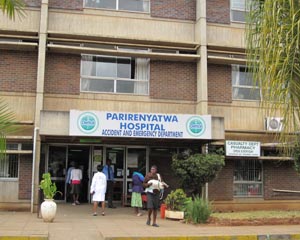
Parirenyatwa Group of Hospitals is finding it difficult to cope with maintenance procedures of some of the state-of-the-art equipment at its cancer unit.
Chief executive officer of the hospital, Thomas Zigora, told a visiting delegation of the Parliamentary Portfolio Committee on Health and Child Care that they were happy with the equipment at the cancer and Intensive Care Units but said the hospital was still negotiating contracts for maintenance of that equipment with a South African company.
The equipment at the cancer unit includes three linear accelerators — a DMX linear accelerator and 600C and Unique linear accelerators which were acquired for US$7 million from Varian, an Australian supplier.
The equipment was said to cost US$1,4 million in maintenance for a period of five years.
“We should not be buying such kind of equipment without putting in place maintenance contracts,” said Zigora. “We are currently negotiating with Tec Med of South Africa so that we can have an annual contract to look into the possibilities of us buying spares, but as a country, we really should not be buying machines if we cannot service them.”
He said Parirenyatwa was one of the best equipped medical institutions in the country with fully functional theatres.
He said the hospital had between 10 to 12 functional theatres and Intensive Care Units that could take in 10 adult patients and 10 child patients, as well as a haemodialysis centre with new equipment.
Zigora said one of the biggest hurdles was the shortage of staff to handle the equipment. There was a serious shortage of oncologists, radiographers, physicists and nurses.
- Chamisa under fire over US$120K donation
- Mavhunga puts DeMbare into Chibuku quarterfinals
- Pension funds bet on Cabora Bassa oilfields
- Councils defy govt fire tender directive
Keep Reading
“Staff will always be a challenge. In the cancer centre we need oncologists, physicists, and radiographers, but we only have three physicists and one of them now wants to go into private practice,” he said.
Cancer treatment, which can be in the form of surgical, chemical or radiotherapy, remains a challenge for most Zimbabweans as it can cost up to US$2 500 for treatment for four to six weeks. — By Veneranda langa











